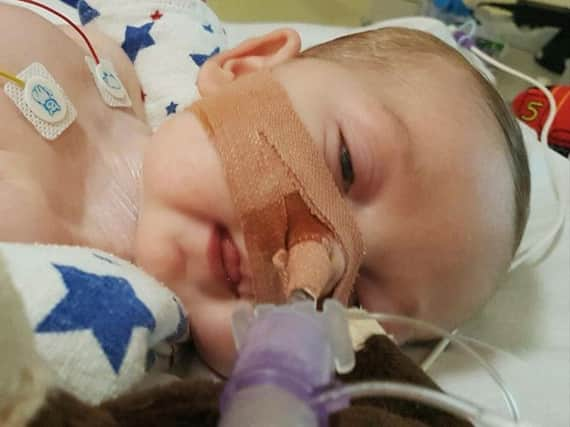Parents get more time to say goodbye to Charlie


Denied the chance to give him therapy and stripped even of the right to say where he would die, Charlie Gard’s parents prepared yesterday to see his life support system turned off.
A round of last minute talks with Great Ormond Street Hospital bought them at least a little more time with their 10 month-old son.
Advertisement
Hide AdAdvertisement
Hide AdThat followed a ruling that they could not take him home to die, and a feeling that they had been “let down” by the protracted legal battle over his future.
Charlie was born with a form of mitochondrial disease, a condition that causes progressive muscle weakness and brain damage.
His parents, Chris Gard and Connie Yates, wanted him to undergo a therapy trial in the US. But after they had exhausted all avenues in England, their plea for help was rejected by European Court of Human Rights judges in Strasbourg.
At the High Court in April, Mr Justice Francis had concluded that Charlie should be allowed to die with dignity. But his parents needed to explore all possible options,’’ their QC said.
Advertisement
Hide AdAdvertisement
Hide Ad“’They don’t want to look back and think ‘what if?’” he said.
Mr Gard and Ms Yates, both in their 30s, posted a video on YouTube and wrote alongside it: “We are utterly heartbroken spending our last precious hours with our baby boy.
“We’re not allowed to choose if our son lives and we’re not allowed to choose when or where Charlie dies. We, and most importantly Charlie, have been massively let down throughout this whole process.”
Charlie’s plight has touched many people and his family has received donations totalling more than £1.3m to take him to the US.
Advertisement
Hide AdAdvertisement
Hide AdHis parents said Charlie would die “knowing that he was loved by thousands”.
Katie Gollop QC, who led Great Ormond Street’s legal team, suggested that further treatment would leave Charlie in a ‘’condition of existence’’.
She said the proposed therapy was ‘’experimental’’ and would not help the boy.
‘’There is significant harm if what the parents want for Charlie comes into effect,’’ she told appeal judges. ‘’The significant harm is a condition of existence which is offering the child no benefit.
‘’It is inhuman to permit that condition to continue.’’
Advertisement
Hide AdAdvertisement
Hide AdMs Gollop said nobody knew whether Charlie was in pain, “because it is so very difficult because of the ravages of Charlie’s condition”.
A guardian appointed to represent the baby’s interests said doctors should stop life-support treatment.
Barrister Victoria Butler-Cole, who was instructed by the guardian, had said life-support treatment would not benefit Charlie but ‘’prolong the process of dying’’ and added: ‘’This is not pioneering or life-sustaining treatment, but a purely experimental process with no real prospect of improving Charlie’s condition or quality of life.’’
The appeal judges had paid tribute to the couple. But they said Mr Justice Francis had been entitled to reach the conclusions he reached.